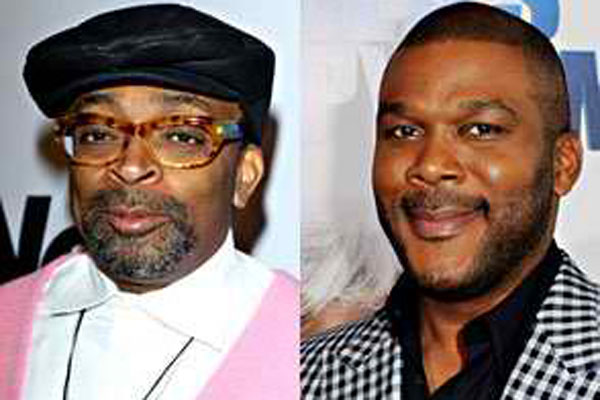Two famous multi-talented black directors, actors and all-around media moguls are engaging in a war of words “unbecoming” a gentleman.
Tyler Perry lashed out at a Beverly Hills press conference promoting his latest movie, “Madea’s Big Happy Family,” when the matter of Spike Lee came up.
“I’m so sick of hearing about damn Spike Lee,” Perry said during the press conference, according to Box Office Magazine. “Spike can go straight to hell! You can print that. I am sick of him talking about me.”
Perry’s remarks were referencing Lee’s criticism of Perry’s work.
Lee was said to have criticized Perry’s films, categorizing them as minstrel-like and full of images demeaning to black America. But Perry isn’t the only person in Hollywood allegedly on the receiving end of Lee’s insults.
“I am sick of him — he talked about Whoopi, he talked about Oprah, he talked about me, he talked about Clint Eastwood. Spike needs to shut the hell up,” Perry ranted.
Perry went on to say this type of attack is not common in other cultures
“I’ve never seen Jewish people attack Seinfeld and say, ‘This is a stereotype.” “I’ve never seen Italian people attack “The Sopranos,” I’ve never seen Jewish people complaining about “Mrs. Doubtfire” or Dustin Hoffman in “Tootsie,” said Perry, according to Box Office Magazine.
Many feel Lee’s attacks on Perry are unnecessary and unfair. To be frank, Spike Lee opened the door for directors like Perry, and Perry’s accomplishments have taken it to another level. This war of words – or war between creative geniuses – is just not what is needed in black America.
Whether we agree or disagree with the characters portrayed by Perry — most famous being a gun-toting, smack-talking “grandma in drag” Madea – he should not be torn down because of the way he expresses his views.
Some writers use satire or comedy to get their visions across, and while the Madea character is somewhat over the top, she is usually giving life lessons about female empowerment, family togetherness, drug abuse, weight issues, body image and a long list of real issues affecting all Americans today.
Lee used the same type of comedy when making points in the 80s hit “School Daze.” He had women dancing around, calling each other “wannabees” and jigaboos” all in the name of raising social awareness and tolerance within one’s own race.
I am a chocolate sister, and boy did I get the “jigaboo” for life insults when I was in middle school after the movie came out. While I was very smart and got the “real” meaning of the movie, some of my “less intelligent” classmates just used it as an insult to attack and belittle people of darker skin.
So, instead of Lee –who I greatly admire and respect – being overly critical about Perry’s movies, he should just accept their differences and recognize Perry as a Hollywood heavyweight making a positive impact for blacks in the industry, just like Lee.
Perry noted other prominent African American figures have faced similar critiques.
“Booker T. Washington and W. E. B. Du Bois went through the exact same thing,” he said.
And in thinking of the two, one can liken Du Bois’ “double consciousness” of the American Negro male concept to the “double consciousness” of blacks in Hollywood.
“Double consciousness,” according to Du Bois, means a “sense of always looking at one’s self through the eyes of others.”
The term originated from an 1897 Atlantic Monthly article of Du Bois’ titled “Strivings of the Negro People.” It was later republished and slightly edited under the title “Of Our Spiritual Strivings” in his collection of essays, The Souls of Black Folk, as stated in Wikipedia.
The concept described the felt contradiction between social values and daily struggles faced by blacks in the United States. Being black, Du Bois argued, meant being deprived of a “true self‐consciousness.” Blacks often perceived themselves through the generalized contempt of white America.
One ever feels his two-ness,–an American, a Negro; two warring souls, two thoughts, two unreconciled strivings; two warring ideals in one dark body, whose dogged strength alone keeps it from being torn asunder, according to Du Bois.
And in translating Du Bois’ writings, whether you do or don’t agree, one can only imagine: It is hard enough for blacks in Hollywood without being attacked by your own kind.
“Wake up,” as Laurence Fishburne bellowed at the end of Lee’s “School Daze.” “Wake up!”

